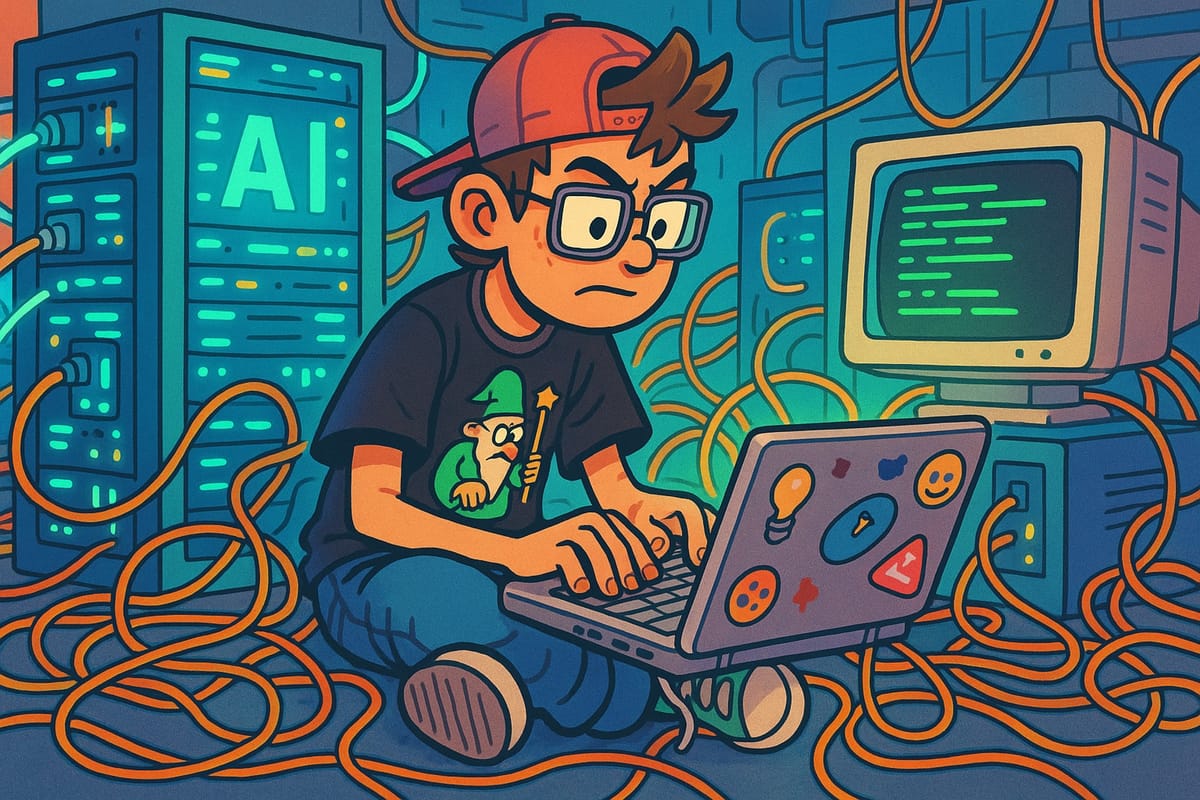Why 2025 Feels Like 2005: AI and the Rebirth of Personal Computing

The release of Claude Code and other advanced AI software development tools marks a pivotal moment in personal computing—one that feels remarkably similar to the Web 2.0 revolution of the mid-2000s.
When I graduated college the web and computers felt totally different than they do today. For years, we've watched as major tech platforms increasingly constrained what users could do with their own devices, turning our "personal computers" into carefully curated experiences defined by Apple's App Store policies, Google's web ecosystem decisions, and other corporate walled gardens. But AI agents, particularly those built on open protocols like the Model Context Protocol (MCP), are beginning to restore genuine personal agency to computing.
This shift feels like the transformative period when the web evolved from static pages to dynamic, user-generated platforms that democratized content creation and interaction. Just as Web 2.0 gave individuals the tools to build, share, and collaborate in ways previously reserved for large organizations, today's AI tooling is putting sophisticated development capabilities directly into users' hands.
I still remember the thrill of firing up Doom on my family IBM PC—that intoxicating feeling of having a machine that was truly mine, capable of running whatever software I could get my hands on, limited only by my curiosity and willingness to tinker. That sense of boundless possibility, where your computer felt like a gateway to infinite worlds rather than a curated storefront, has been largely absent from computing for years. We became passive consumers of pre-approved applications, living within the carefully constructed boundaries of app stores and platform policies.
But AI agents are bringing back that original PC magic. Instead of being limited to whatever software companies decide to build for us, we're entering an era where anyone can effectively collaborate with AI to create custom solutions, automate workflows, and build tools tailored to their exact needs. The computer is becoming truly personal again—not just in name, but in the way it adapts to serve your unique vision rather than forcing you to adapt to its limitations.
AI Software Tooling
Over the past few months, I've been on a journey through every major coding agent available—from local models running on Ollama to JetBrains AI, Cursor, Windsurf, Gemini 2.5 Pro, OpenAI's offerings, and now Claude Code with the latest version 4 models. What struck me was the dramatic leap forward every 2-3 months as new models emerged and interfaces evolved. But it wasn't until I tried the latest terminal-native tools—OpenAI's Codex CLI and Claude Code—that I experienced what felt like a fundamental shift in how we interact with computers.
For someone who lives in the terminal, these tools hit a sweet spot that graphical interfaces couldn't quite capture. The AI becomes the smartest rubber duck you've ever worked with, except this one can actually write code alongside you. It's like having a brilliant pair-programming partner who never gets tired, never judges your questions, and can context-switch between languages and frameworks instantly. The confidence this brings is transformative—suddenly, any idea feels buildable, any technical challenge feels surmountable.
This experience reinforced exactly what I meant about putting the "personal" back in personal computing. Instead of being constrained by pre-built applications or wrestling with complex development environments, I'm collaborating directly with AI to create exactly what I need. The upcoming integration of these agents into pull request workflows feels like the natural next step, but even today's capabilities represent a profound democratization of software creation.
Cooking with Claude Code + MCP
This weekend, I experienced firsthand what this new era of personal computing looks like. In just two hours and roughly $37 in API tokens, I built the foundation of my own personal MCP server—a digital nervous system that connects all the software tools that I use every day. Email, calendar, files, my website, my Notion workspace—all suddenly are now able to be interacted with via natural language.
The breakthrough moment came when I tackled something I'd wanted for years: automatically scheduling daily "reading time" with a curated selection of articles I bookmark throughout the day. In the old world, this would have required weeks of development, multiple API integrations, complex scheduling logic, and probably a subscription to yet another productivity service. With Claude Code and the Model Context Protocol, I had it working in under 2 hours.
Now I have an AI agent that understands my reading habits, curates the articles I save, and seamlessly places focused reading sessions into my calendar exactly when and how I prefer them. It's not just automation—it's personalization at a level that feels almost magical. This is what I mean by putting the "personal" back in personal computing: technology that adapts to your unique needs rather than forcing you to adapt to its limitations.
The Future is Bright
What excites me most is imagining this same joy and empowerment reaching people who don't traditionally code. Just as the Web 2.0 era enabled anyone to become a content creator, I believe we're approaching a moment where AI will make software creation accessible to everyone—not through simplified "no-code" abstractions, but through genuine partnership with intelligent agents. The key, as always, will be embracing change rather than resisting it. Those who adapt to this new paradigm won't just be more productive—they'll rediscover the creative freedom that personal computing was always meant to provide.